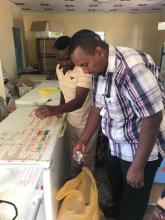Kenya joins the world in historical tOPV to bOPV SWITCH
Kenya joined the rest of the world in April 18, 2016, to implement SWITCH, the global health effort to shift from the use of trivalent oral polio vaccine (tOPV) to bivalent oral poliovirus vaccine bOPV.
The activity countrywide was marked by an aggressive effort to retrieve all tOPV vaccine from all the health facilities and placement with bOPV.
The global switch activity is scheduled between April 17 and May 1, 2016 and involves 156 countries. It is considered the largest withdrawal of one vaccine and roll out of another in vaccine history.
Health workers across Kenya, who were prepared for the activity prior to the day, made sure they followed the guidelines to the full. Independent monitoring by selected monitors will follow in the coming days as a first step of verifying and validating that the activity took place.
The activity came soon after a countrywide polio campaign, National Immunization Days, conducted from April 9-13 and engaged partners, supervisors and thousands of vaccination teams.
The global withdrawal is necessitated by the confirmation that one of the three strains of wild poliovirus is eradicated. This strain, type 2, has not been active and was last recorded in India in 1999. The Global Commission for the Certification of Eradication of Poliomyelitis confirmed its eradication in September, 2015.
The eradication of type 2 meant that only two of the strains - Type 1 and 3 – remain in circulation, and hence the use of trivalent oral polio vaccine or tOPV which contains three strains to vaccinate against two strains is no longer necessary.
Across the country teams strategized around the logistics of distant-located facilities to ensure they fulfil the SWITCH requirement.
“We planned ahead so that we could move the bivalent vaccine to those distant health facilities earlier and retrieve the tOPV immediately after completion of the campaign,” Dr Oscar Endekwa, health director of Tana River County explained.
He said the placement of tOPV with bOPV in fridges was done immediately after the retrieval. The tOPV was the vaccine used for the just ended polio campaign.
He said all trivalent vaccine had been withdrawn to the sub-county headquarters and was to be brought to the county headquarters awaiting destruction.
WHO technical officers and other partners supported the effort by visiting health facilities to ensure tOPV retrieval and placement with bOPV.
“The exercise was completed in Garissa County,” Dr Ahmed Hassan, WHO, reported.
I was able to visit facilities and confirm bOPV is being given and no tOPV is in fridges. This was also confirmed by documentation in vaccine ledger books.
In Turkana all tOPV was retrieved from the facilities at the end of the campaign and the vaccines taken to the sub-county stores and out of the cold chain awaiting directions for process of destruction. One sub-county already destroyed their stock. Some sub-county teams distributed the bOPV as they distributed vaccines and tools for the just concluded campaign. The sub-county EPI logisticians also went round facilities to distribute to those who had not picked, and ensuring no tOPV was left in facilities.
The trivalent oral polio vaccine has been in use for many years and is responsible for the reduction of cases from 350,000 in 1988 to 74 in 2015. The countries endemic to the polio have also reduced from 125 to just two, Afghanistan and Pakistan.
The trivalent oral polio vaccine contains live attenuated or weakened virus of all three serotypes and is able to replicate in the gut for the individual to get an immune response. In very rare cases, the vaccine-virus could regain its strength to become what is known as circulating vaccine-derived poliovirus (cVDPV) which can cause paralysis. The type 2component of tOPV causes more than 90% of vaccine-derived polio viruses (VDPVs). Currently, the risks associated with continued use of the type 2 component of tOPV outweigh the benefits and hence the rationale for its withdrawal.
The planned withdrawal of type 2 component of tOPV is part of the global polio eradication endgame strategy for 2013-2018.
___________________________________________
For more information, please contact:
Jemimah W Mwakisha PhD, Communication & Social Mobilization, Tel: 254 710 149489, Email: mwakishaj [at] who.int (mwakishaj[at]who[dot]int)







